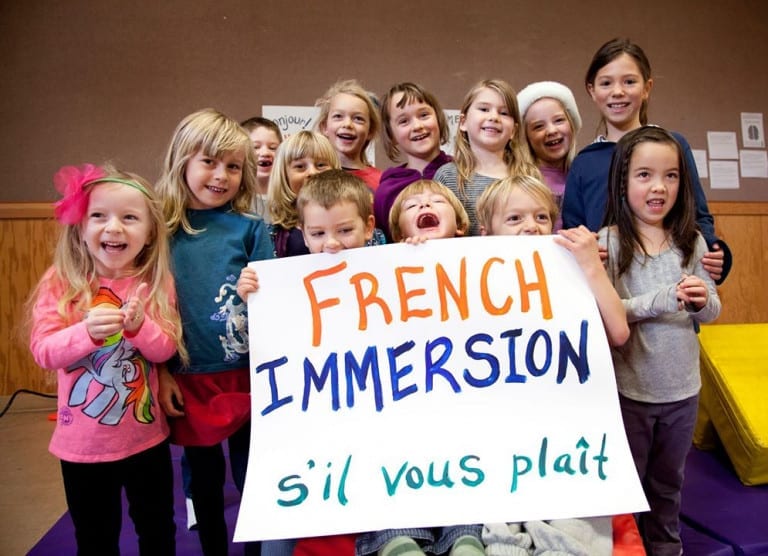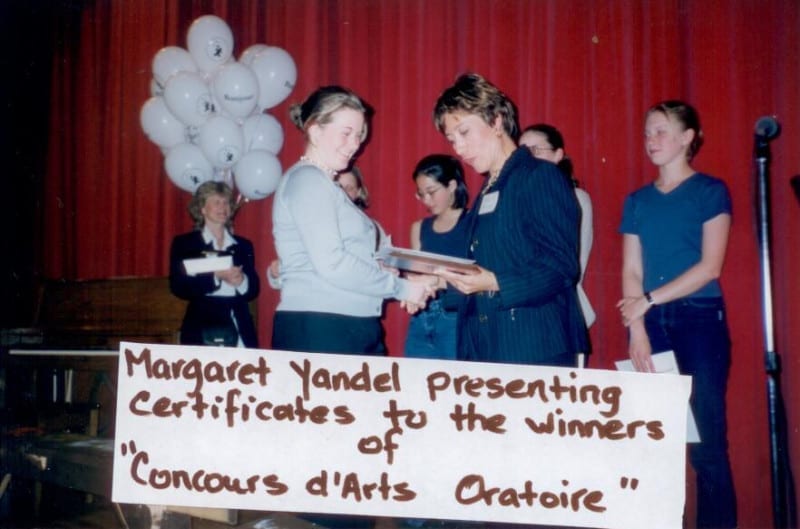What We Stand For
Canadian Parents for French BC & Yukon registered in 1978, one year after the National Branch was founded and eight years after the first French immersion program was introduced in the province.
In 1968, a class of Kindergarten students in Coquitlam, B.C. – historically a bastion for Francophones in the West – launched what would become the strongest second-language program in the province.
Since, volunteers and educators have been creating resources, stirring up momentum and lobbying decision makers to reinforce and expand French-language programs across B.C. and Yukon.
More than 50 years later, CPF BC & Yukon continues to build upon its founding pillars of universal access, effective programs, standardized proficiency levels and accountability.

Mission statement
Canadian Parents for French (CPF) is the national network of volunteers which values French as an integral part of Canada and which is dedicated to the promotion and creation of French-second-language learning opportunities for young Canadians.
Vision statement
A Canada where French and English speakers live together in mutual respect with an understanding of each other’s language and culture, and where linguistic duality forms an integral part of society.
The Four Pillars of CPF
Universal access:
In Canada, every student has the opportunity to learn French and access the French as a second official language program that meets his or her needs and aspirations.
Students have access to a sufficient variety of FSL programs when:
- There is open enrolment with no admission criteria or enrolment caps so that no child is turned away;
- Programming and specialist services are provided for gifted, special needs, and Allophone students;
- Every parent is regularly informed about FSL options and entry points;
- All students receive the information they need to make decisions about continuing to learn French at the secondary and post-secondary levels as well as outside of the education system;
- Transportation is provided at no cost for both urban and rural students;
- Distance learning is available to provide FSL learning for students in small and remote communities;
- No additional fees are charged for FSL programs.
Accountability for student achievement:
Governments are accountable for reporting on achievement of students and French as a second official language programs. Parents and community stakeholders are actively engaged and involved in decision-making with school boards.To that end, CPF sees FSL programming as a shared responsibility, and promotes cooperation between government, school districts and parents on such matters as:
- Student French-proficiency achievement and current research findings being reviewed regularly, with policies and curricula being adjusted accordingly;
- Adequate, sustainable program funding being secured for various FSL programs, with the amount of funding being in direct co-relation to FSL enrolment and in compliance with the French Funding Guide; and that the amount and flow of these funds be transparent;
- Provincial policies and guidelines for FSL programs be communicated directly to parents, teachers and administrators;
- Parents and other community stakeholder organizations are informed of FSL issues to be considered and are actively involved in decision-making at the school, school district, and government levels.

Effective programs:
All students have access to a wide variety of effective, evidence-based French as a second official language programs from Kindergarten to Post-secondary. CPF believes that excellent and effective FSL programming is ensured when:
- Research into FSL education is supported and used to inform policies, program design, and student proficiency expectations;
- Graduates receive official recognition of their French proficiency achievements;
- New technologies are used to enhance FSL learning in the classroom.
Recognized proficiency levels:
Proficiency levels and goals are in place so language learners, parents, teachers, post-secondary institutions and potential employers have a common understanding of each learner’s French-language abilities and the expectations of respective programs.CPF believes in setting clear expectations for language proficiency, and in establishing measures to determine that expectations are being met.
Here are some aspects of policy and action items that go towards a robust second language learning system:
- Ministries of education and school districts have written FSL policies and guidelines which provide written goals for student French proficiency for all programs and specify sufficient hours of FSL instruction to achieve those goals;
- There is an adequate supply of quality teaching/learning resources;
- French-second-language teacher qualifications for all programs specify French-language proficiency, second-language teaching methods and subject competence;
- Mechanisms are in place to ensure a sufficient supply of qualified FSL teachers;
- There are adequate professional activities for FSL teachers to keep up with current pedagogical practices;
- School administrators receive the resources they need in order to effectively plan for and supervise the FSL programs in their schools.
Canadian Parents for French supports the use of standardized FSL proficiency testing, using national benchmarks to accomplish a variety of objectives
French Second Language proficiency testing includes a variety of measures that address performance and outcomes. This includes (and isn’t limited to):
- allowing secondary FSL teachers and students to assess individual student performance and to develop appropriate individualized strategies for improvement;
- Establishing national, comparable standards of French proficiency outcomes for graduates from various elementary and secondary FSL programs;
- establishing national standards for FSL teacher accreditation: this includes an entrance assessment to determine whether language upgrading is required, and an exit requirement to ensure that proficiency standards have been met.
CONTACT US
Have a question or feedback for CPF BC & Yukon? Submit it through the contact form below and we’ll make sure it gets to the right person. À bientôt!
